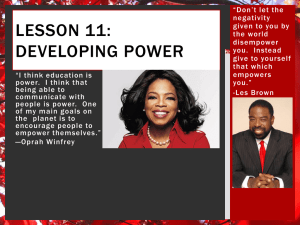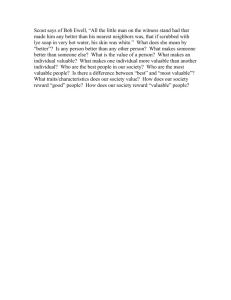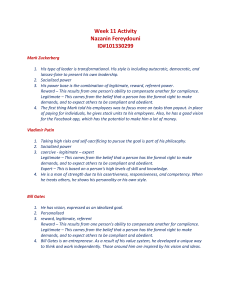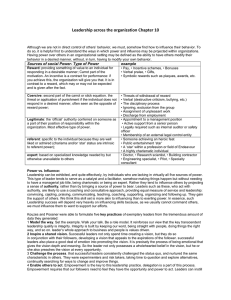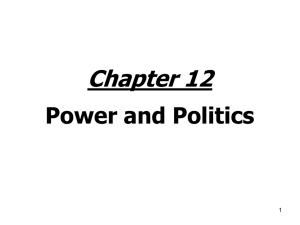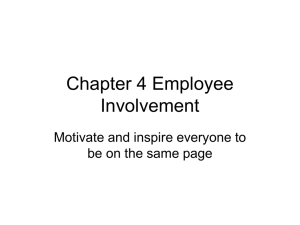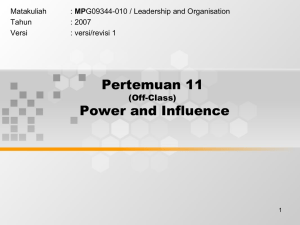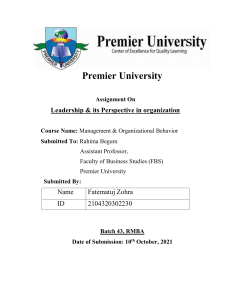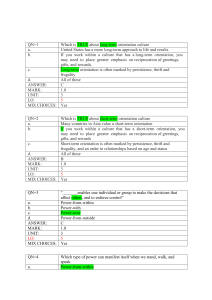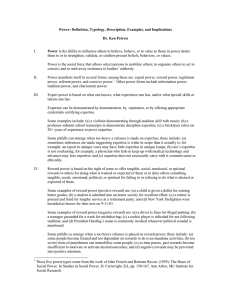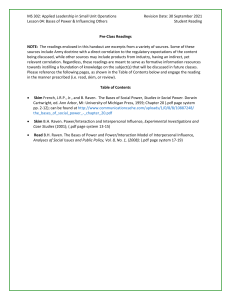Interpersonal Power & Influence: Communication Dynamics
advertisement
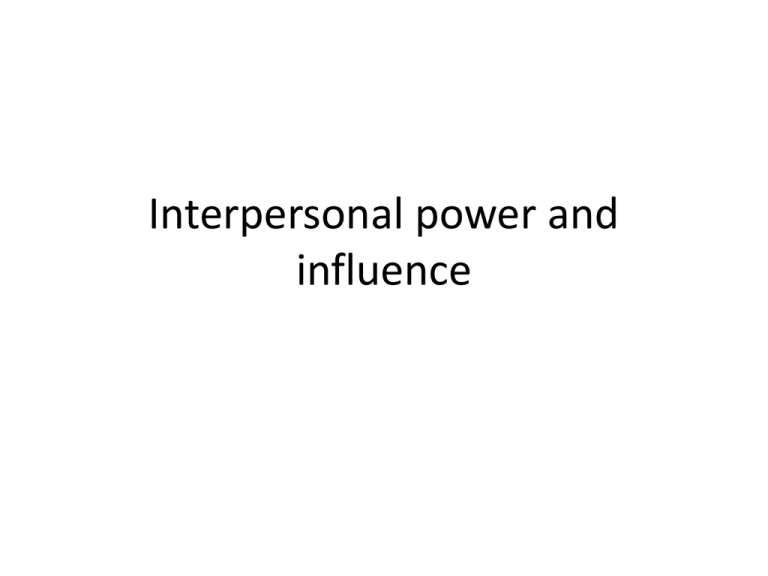
Interpersonal power and influence • "Power is the ability of one person to influence what another person thinks or does. You have power over another person to the extent that you can influence what this person thinks or what this person does."--DeVito Power in Interpersonal Communication • Some people are more powerful than others • Power can be shared, There are a few strategies to empowering other people. First, raise the other person's self esteem. Second, be open, be positive, be empathetic, and be supportive. Third, Share skills and decision making with others • Power can be increased/decreased. Learning the principles of communication can increase persuasive power. On the other hand, unsuccessfully trying to control another person's behavior, or allowing others to control you unfairly causes a loss of power. • Power follows the principle of less interest. The person who holds the power is the one less interested in, and less dependent on the rewards and punishments controlled by the other person. Power also follows the laws of supply and demand.The more a person needs a relationship, the less power that person has in it, and vice versa • Power generates privilege. "When one person has power over another person, the person with power is generally assumed to have certain privileges, many of which are communication privileges" (Devito, 2009, p. 301). People with power are allowed to break rules that those of lesser power cannot; for example, people with the superior power can invade people's space, have the last word. • Power has a cultural dimension. There is a discrepancy that is present between people and attitudes regarding power in different cultures. Power in the relationship: • Referent power: If you can make others want to be like you or want to be identified with you, you'll gain compliance easily. This would be like the power an older sibling has over a younger sibling. Once a person decides they want to be like you, then it'll take less effort to influence the other person • Legitimate power: If others believe you have the right by virtue, or by your position, to influence or control their behavior, you would be demonstrating legitimate power. According to DeVito, "Legitimate power stems from our belief that certain people should have power over us, that they have the right to influence us because of who they are. For example, a teacher, religious leaders, employers, doctors, police officers • Expert power: This is when you're seen as having expert knowledge over a specific subject. For example, when you're sick you go to the doctors because you know they have expert knowledge in that field. You wouldn't go to a mechanic for answers about surgery risks and benefits. Your power increases when you're seen as an unbiased person with nothing to gain personally from helping others. On the other hand, you're seen as less powerful when you are biased or have something large to gain. • Information or persuasion power: You have this power over others when you're seen by others as having good, logical communication, and that you can be effectively persuasive. This means you are capable of coming up with a well thought-out argument to state your case. • Reward power: This is the power you have when you reward others. For example, teachers have a reward power over students because teachers can reward students with good grades. Students also have reward power over teachers because they give the evaluations to teachers, and they also have control over the word-of-mouth social approval • Coercive power: This is when you have the ability to punish somebody if they do not do what you ask. Teachers also have coercive power because they can give poor grades to students. The strength of this power depends on (1) the magnitude of the punishment that could be administered, and (2) the likelihood that the punishment will be given when someone doesn't do what they've been asked. Power in the person: • Competence: According to DeVito, this is the knowledge and expertise that other people believe you have. The more people believe you have knowledge and expertise, the more they will be influenced by you. For example, if you see a doctor's degrees hanging on the wall in his office, you are likely to believe him more because it's apparent he has a vast knowledge in the subject. • Character: This involves the motives and intentions behind your influences. If people see that you are to gain a great deal personally, you may not be seen as having good character. This is why it's important to be honest, and show people that you can be trusted without having to personally gain from the situation • Charisma: This is other people's views of your personality. If you're friendly, assertive, and dynamic, people will tend to see you as being charismatic. However, people will think the opposite if you are aloof, reserved, hesitant, and non-assertive.
